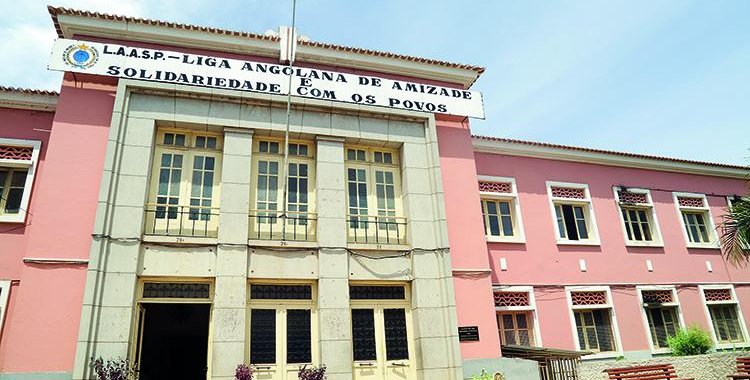The emblematic pink building, an ex-libris of the city of Luanda at the colonial time, whose construction started when Marcelo Caetano was minister of the Colonies and was inaugurated in 1953, dominates a block of the street with the same name.
It is there that the president of the African League, Carlos Mariano Manuel, explains how the organization was the main seat of Angolan nationalism and inspired nationalists from other African countries that were part of the Portuguese colonial empire in Africa and "were received in this house long before the 25th of April".
Among them, the founder of the Front for the Liberation of Mozambique (Frelimo) Eduardo Mondlane who, in his passage through Angola, towards the United States, where he would continue his studies.
Also prominent figures of the Portuguese Estado Novo were part of a visit to the headquarters of the League when they traveled to Luanda.
The institution was used by the Portuguese authorities as a demonstration of its "virtuous activity of social promotion of the natives of Angola", explains the doctor Carlos Mariano, professor at the Faculty of Medicine of the Agostinho Neto University.
Óscar Carmona, in 1938, Craveiro Lopes, in 1954 and the last Portuguese President of the Estado Novo, Américo Tomas, passed by.
And while the members of the union called for greater social justice and freedom, the colonial authorities tried to attract the leaders of the League "to the reformist theories of integrating Angola into the Portuguese empire".
Inevitably, there were moments of tension. In December 1956, the new elected governing bodies provoked the Portuguese authorities' displeasure and ended up only remaining in office for five months.
"Its members profiled a line of action that was not integrative of Angola and, for that reason, in May 1957, the colonial authorities imposed an administrative commission on the League that was in effect until the proclamation of Independence in 1975", recalls Carlos Mariano.
The League was even suspended. Accused of having been the basis of uprisings and protests, carried out in the 1920s, against "the discriminatory segregationist policy of domination that was carried out by the colonial authorities", the organization created in 1912 as the Angolan League, it begins to awaken in colonial authorities feelings of "bad will" in relation to its existence.
And that is how Norton de Matos, the governor who had allowed its foundation and "a staunch defender of the interests of colonialism", ended up deciding, in 1923, to suspend the operating license of the Angolan League.
"Naturally, the leaders of the native community, the most educated at the time, thought about how they could get around this malquerence that existed from the colonial authorities", highlights the academic.
Seven years later, "a group of four or five distinguished members of Angolan civil society" endeavored with the colonial representatives for the organization to be recreated, resurging as an African National League.
Carlos Mariano says that the relationship of the leaders of the League was made in the first instance with the authorities that represented the Portuguese power in Angola, but when "issues relevant to the social promotion of the natives of Angola, they did not have adequate referral to the highlighted colonial authorities", those responsible turned to the empire's capital.
The Portuguese authorities intended at all costs that "there would be some kind of social valorization of the native population that would become a more qualified human capital even for the purposes of colonization", with the instruction considered the quintessence of the League's activities.
The leaders of the League, on the other hand, often advocated "the just causes of the people of Angola", such as, for example, extending the identity card that, until 1962, was granted only to natives with assimilated status.
The League would gradually become a vehicle for opposition to the new state regime and Portuguese colonialism, reinforcing its presence as a "nativist" civil society organization, which intended to assert a kind of Angolan African nationality "against the will of the authorities colonial", who reiterated that there are no Angolans, but Portuguese nationals of Angola.
A significant part of the leaders of the political movements that formed in the second half of the 1950s were, if not all, members of the African National League, including some leaders, he stressed.
From the Salvador Correia high school, which Carlos Mariano himself attended, came the first students "from the native population" whom they identified in the National African League, "a vehicle under whose auspices they could organize themselves to study more refined, more organized ways of oppose the colonial regime and the Estado Novo regime that existed in Portugal, which naturally dominated the Portuguese people and the peoples of the Portuguese colonies ".
For Carlos Mariano, "the National African League was a place where the tirocinado took place, whose epilogue was the consolidation of convictions, which allowed the foundation of political organizations, such as the MPLA, which is the political force that still governs the country" .
Forty-five years after independence, this centenary organization continues to exercise multiple activities, remaining dedicated to social solidarity and cultural activities and is a partner of the Government in the ongoing national reconciliation process.
It also maintains a "dynamic" relationship with other institutions of the Lusophone community, including the Community of Portuguese Speaking Countries (CPLP) and other institutions of civil society in the Lusophone space, namely the International Lusophone Movement
"This is just the beginning of a journey that began in 1912 and that we intend never to be extinguished", concludes Carlos Mariano.







